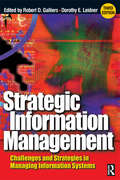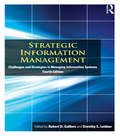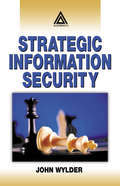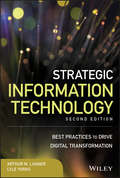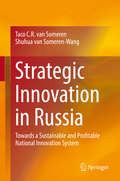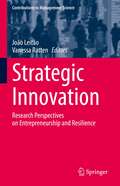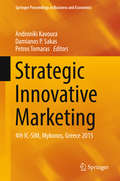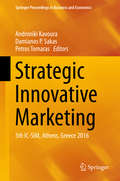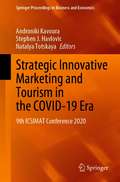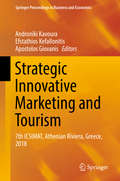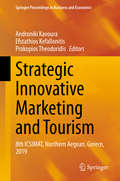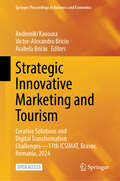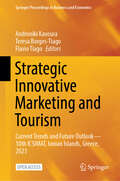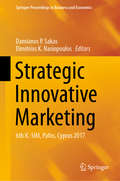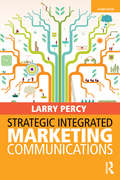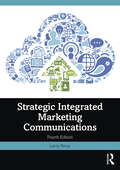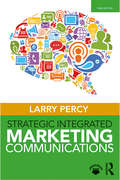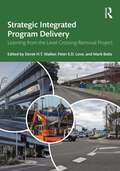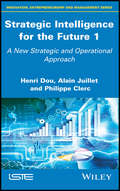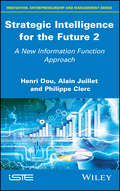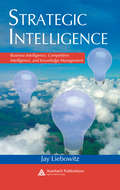- Table View
- List View
Strategic Information Management: Challenges And Strategies In Managing Information Systems (Management Reader Ser.)
by Robert D. Galliers Dorothy E Leidner'Strategic Information Management' has been completely up-dated to reflect the rapid changes in IT and the business environment since the publication of the second edition. Half of the readings in the book have been replaced to address current issues and the latest thinking in Information Management. It goes without saying that Information technology has had a major impact on individuals, organizations and society over the past 50 years or so. There are few organizations that can afford to ignore IT and few individuals who would prefer to be without it. As managerial tasks become more complex, so the nature of the requiredinformation systems (IS) changes - from structured, routine support to ad hoc, unstructured, complex enquiries at the highest levels of management.As with the first and second editions, this third edition of 'Strategic Information Management: Challenges and strategies in managing informationsystems' aims to present the many complex and inter-related issues associated with the management of information systems. The book provides a rich source of material reflecting recent thinking on the key issues facing executives in information systems management. It draws from a wide range of contemporary articles written by leading experts from North America and Europe.'Strategic Information Management' is designed as a course text for MBA, Master's level students and senior undergraduate students taking courses in information management. It provides a wealth of information and references for researchers in addition.
Strategic Information Management: Challenges and Strategies in Managing Information Systems (Management Reader Ser.)
by Robert D. Galliers Dorothy E. LeidnerToday there are few organizations that can afford to ignore information technology and few individuals who would prefer to be without it. As managerial tasks become more complex, so the nature of the required information systems changes from structured, routine support to ad hoc, unstructured, complex enquiries at the highest levels of management. As with the first three editions, this fourth edition of Strategic Information Management: Challenges and Strategies in Managing Information Systems presents the many complex and inter-related issues associated with the management of information systems. This book provides a rich source of material reflecting recent thinking on the key issues facing executives in information systems strategic management. It draws from a wide range of contemporary articles written by leading experts from North America, Asia, and Europe. Designed as a course text for MBA, Master's level students, and senior undergraduate students taking courses in information management, it also provides a wealth of information and references for researchers. New to this edition are updated readings addressing current issues and the latest thinking in information management.
Strategic Information Management: Theory and Practice
by Robert D. GalliersToday, there are few in senior management positions who can afford to ignore modern information technology, and few individuals who would prefer to be without it. Modern IT is key to organizational performance; yet we often assume the benefits will occur without forethought or effort. As managerial tasks become more complex, so the nature of the required information systems changes – from structured, routine support to ad hoc, unstructured, complex enquiries at the highest levels of management. If taken for granted, serious implications can arise for organizations. This fifth edition of Strategic Information Management has been brought fully up to date with recent developments in the management of information systems, including digital transformation strategy, the issues surrounding big data and algorithmic decision-making. The book provides a rich source of material reflecting recent thinking on the key issues facing executives, drawing from a wide range of contemporary articles written by leading experts in North America, Europe, and Australia. Combining theory with practice, each section is fully introduced, includes further reading and questions for further discussion. Designed for MBA, master's level students, and advanced undergraduate students taking courses in information systems management, it also provides a wealth of information and references for researchers.
Strategic Information Security
by John WylderThe new emphasis on physical security resulting from the terrorist threat has forced many information security professionals to struggle to maintain their organization's focus on protecting information assets. In order to command attention, they need to emphasize the broader role of information security in the strategy of their companies. Until now
Strategic Information Technology: Best Practices to Drive Digital Transformation (Wiley CIO)
by Arthur M. Langer Lyle YorksSuccessfully navigate the changing face of the CIO role Strategic Information Technology offers CIOs a handbook for engaging with the senior management conversations surrounding strategy. The CIO role is currently undergoing a massive transition from technology-focused expert to a more strategic mindset, and this book provides proven methods for taking your seat at the table. Lessons from high-performing CIOs and a wealth of leading-edge insight provide invaluable guidance for positioning technology as a strategic driver across the business, while a focus on building the necessary connections—for example, an alliance between IT and HR—provide a multimodal approach to navigating the transition. The evolution of the CIO’s role involves more than simply technical knowledge; the new CIO must be an influencer, an engager, and just as adept at the soft skills that become increasingly crucial as you climb the management ladder. It’s about changing mindsets, translating hard skills into strategic advantages, and demonstrating IT’s value to the strategic decision making process. This book provides best practices, illustrative examples, and up-to-date perspective for CIOs wanting to: Position IT as a critical driver of overall strategy Build on functional expertise with strategic insight Learn from the stories of successful tech-to-strategy transformations Engage C-Suite peers in shaping the strategic conversation Not long ago, the CIO occupied a unique place in the C-Suite. Executive by title, CIOs have nevertheless been seen as predominantly the “chief tech expert” with little input into strategy, as IT has historically been regarded as a tool rather than a source of competitive advantage. The truth is becoming increasingly apparent, with companies around the world turning to technology in order to gain a competitive edge, and CIOs are beginning to claim their place in strategy discussions. Strategic Information Technology offers much needed guidance for a successful transformation.
Strategic Initiatives: Launching the Strategy into Motion
by Robert S. Kaplan David P. NortonStrategic initiatives are the collections of short-term discretionary projects and programs, outside the organization's day-to-day operational activities, that are designed to help the organization achieve its targeted performance. They also help accelerate an organizational mass into action and overcome inertia and resistance to change. This chapter discusses three processes involved in managing a portfolio of strategic initiatives: selecting initiatives, providing resources for them, and assigning accountability for executing them.
Strategic Innovation at the United Nations: A Network of Ecosystems
by Elizabeth J. Altman Amy Klopfenstein Frank NagleIn 2021, Gina Lucarelli, leader of the United Nations Development Programme (UNDP) Accelerator Labs, prepared for a meeting with UNDP Administrator Achim Steiner. The two planned to discuss the future of the Accelerator Labs, a network of social innovation labs located in countries throughout the world. The labs discovered promising solutions to social problems within a specific local community and elevated their learnings to the lab network. The first set of labs launched in 2019 and had high levels of autonomy, essentially operating as startups. While Lucarelli was pleased with the progress of the first cohort of labs, she was uncertain whether Steiner would continue them beyond their initial three-year funding window. Lucarelli envisioned three paths forward for the labs. The labs could wind down and integrate their methodologies into UNDP country offices, secure independent funding and spin out from UNDP, or reintegrate with the central organization and operate within the UN's research and development division. At the conclusion of the case, Lucarelli must decide which would be the best option to advance UNDP's mission of promoting environmental sustainability and global well-being.
Strategic Innovation in Russia
by Shuhua van Someren-Wang Taco C. R. van SomerenThis book presents a radically different approach to innovation aimed at creating new growth cycles for the Russian economy. To better grasp the opportunities hidden behind worldwide megatrends, such as the growing economic prosperity of Asian countries and the importance of the internet-based economy, the authors argue for a reinvention of Russia's innovation strategy. Instead of a purely technology-driven approach, the authors illustrate how the principles of strategic innovation help develop institutional and non-technical innovation, as well as new forms of leadership and entrepreneurship within the Russian business culture. The authors also discuss the impact of strategic innovation on corporate strategies, innovation and economic policy, as well as academic research and development agendas. The book also sheds new light on how cooperation between Russia and the EU, the US and China in the area of innovation can be of mutual benefit.
Strategic Innovation: New Game Strategies for Competitive Advantage
by Allan AfuahIn today's fast-changing business environment, those firms that want to remain competitive must also be innovative. Innovation is not simply about developing new technologies into new products or services, but in many cases, finding new models for doing business in the face of change. It often entails changing the rules of the game. Strategic Innovation demonstrates to students how to create and appropriate value using new game strategies to gain competitive advantage. The book begins with a summary of the major strategic frameworks and showing the origins of strategic innovation. Next, Afuah gives a thorough examination of contemporary strategy from an innovation standpoint, including: how to develop strategy in the face of change a detailed framework for assessing the profitability potential of a strategy or product consideration of how both for-profit and non-profit organizations can benefit from new game strategies. With a wealth of quantitative examples of successful strategies, as well as descriptive cases, Strategic Innovation will complement courses in strategy, and technology and innovation.
Strategic Innovation: Research Perspectives on Entrepreneurship and Resilience (Contributions to Management Science)
by João Leitão Vanessa RattenThis edited book focuses on strategic aspects of innovation in the context of resilience during and after a crisis. It investigates the strategies that firms utilize in order to cope with change especially in the competitive global marketplace. The book contends that, by design, entrepreneurship is strategic and innovative in every decision and action of a business. The goal of this book is to focus on the innovation and resilience behind these strategies in order to understand the business motivations. In particular, it focuses on the uncertainties initiated by the COVID-19 pandemic and highlights the growing research and practice experiences of resilient entrepreneurial businesses and innovations that continued to be stable and successful. The book thus extends current research on strategic entrepreneurship by integrating it with the field of resilience. This will help to bridge the gap between practice and theory with regard to strategic entrepreneurship. Furthermore, it enables an effective advancement of strategic entrepreneurship research in light of the COVID-19 pandemic.
Strategic Innovative Marketing
by Androniki Kavoura Damianos P. Sakas Petros TomarasThis book presents the latest on the theoretical approach of the contemporary issues evolved in strategic marketing and the integration of theory and practice. It seeks to make advancements in the discipline by promoting strategic research and innovative activities in marketing. The book highlights the use of data analytics, intelligence and knowledge-based systems in this area. In the era of knowledge-based economy, marketing has a lot to gain from collecting and analyzing data associated with customers, business processes, market economics or even data related to social activities. The contributed chapters are concerned with using modern qualitative and quantitative techniques based on information technology used to manage and analyze business data, to discover hidden knowledge and to introduce intelligence into marketing processes. This allows for a focus on innovative applications in all aspects of marketing, of computerized technologies related to data analytics, predictive analytics and modeling, business intelligence and knowledge engineering, in order to demonstrate new ways of uncovering hidden knowledge and supporting marketing decisions with evidence-based intelligent tools. Among the topics covered include innovative tourism marketing strategies, marketing communications in small and medium-sized enterprises (SMEs), the use of business modeling, as well as reflecting on the marketing trends and outlook for all transportation industry segments. The papers in this proceedings has been written by scientists, researchers, practitioners and students that demonstrate a special orientation in strategic marketing, all of whom aspire to be ahead of the curve based on the pillars of innovation. This proceedings volume compiles their contributions to the field, highlighting the exchange of insights on strategic issues in the science of innovation marketing.
Strategic Innovative Marketing
by Androniki Kavoura Damianos P. Sakas Petros TomarasThis book presents the latest on the theoretical approach of the contemporary issues evolved in strategic marketing and the integration of theory and practice. It seeks to make advancements in the discipline by promoting strategic research and innovative activities in marketing. The book highlights the use of data analytics, intelligence and knowledge-based systems in this area. In the era of knowledge-based economy, marketing has a lot to gain from collecting and analyzing data associated with customers, business processes, market economics or even data related to social activities. The contributed chapters are concerned with using modern qualitative and quantitative techniques based on information technology used to manage and analyze business data, to discover hidden knowledge and to introduce intelligence into marketing processes. This allows for a focus on innovative applications in all aspects of marketing, of computerized technologies related to data analytics, predictive analytics and modeling, business intelligence and knowledge engineering, in order to demonstrate new ways of uncovering hidden knowledge and supporting marketing decisions with evidence-based intelligent tools. Among the topics covered include innovative tourism marketing strategies, marketing communications in small and medium-sized enterprises (SMEs), the use of business modeling, as well as reflecting on the marketing trends and outlook for all transportation industry segments. The papers in this proceedings has been written by scientists, researchers, practitioners and students that demonstrate a special orientation in strategic marketing, all of whom aspire to be ahead of the curve based on the pillars of innovation. This proceedings volume compiles their contributions to the field, highlighting the exchange of insights on strategic issues in the science of innovation marketing.
Strategic Innovative Marketing and Tourism in the COVID-19 Era: 9th ICSIMAT Conference 2020 (Springer Proceedings in Business and Economics)
by Androniki Kavoura Stephen J. Havlovic Natalya TotskayaThis book presents the latest findings of researchers from around the globe who presented their work at the 9th International Conference on Strategic Innovative Marketing and Tourism in the Covid-19 era. It provides up-to-date information and discusses current trends, issues, and debates, as well as theoretical and practical research, on strategic innovative marketing and tourism and applications from social media. Topics covered include social media in marketing and tourism hospitality, and strategic tools and techniques developed and implemented by some of the world’s leading research labs. In addition, the book brings together work from academia and industry.
Strategic Innovative Marketing and Tourism: 7th ICSIMAT, Athenian Riviera, Greece, 2018 (Springer Proceedings in Business and Economics)
by Androniki Kavoura Efstathios Kefallonitis Apostolos GiovanisThis book covers a very broad range of topics in marketing, communication, and tourism, focusing especially on new perspectives and technologies that promise to influence the future direction of marketing research and practice in a digital and innovational era. Among the areas covered are product and brand management, strategic marketing, B2B marketing and sales management, international marketing, business communication and advertising, digital and social marketing, tourism and hospitality marketing and management, destination branding and cultural management, and event marketing. The book comprises the proceedings of the International Conference on Strategic Innovative Marketing and Tourism (ICSIMAT) 2018, where researchers, academics, and government and industry practitioners from around the world came together to discuss best practices, the latest research, new paradigms, and advances in theory. It will be of interest to a wide audience, including members of the academic community, MSc and PhD students, and marketing and tourism professionals.
Strategic Innovative Marketing and Tourism: 8th ICSIMAT, Northern Aegean, Greece, 2019 (Springer Proceedings in Business and Economics)
by Androniki Kavoura Efstathios Kefallonitis Prokopios TheodoridisThis book covers a very broad range of topics in marketing, communication, and tourism, focusing especially on new perspectives and technologies that promise to influence the future direction of marketing research and practice in a digital and innovational era. Among the areas covered are product and brand management, strategic marketing, B2B marketing and sales management, international marketing, business communication and advertising, digital and social marketing, tourism and hospitality marketing and management, destination branding and cultural management, and event marketing. The book comprises the proceedings of the International Conference on Strategic Innovative Marketing and Tourism (ICSIMAT) 2019, where researchers, academics, and government and industry practitioners from around the world came together to discuss best practices, the latest research, new paradigms, and advances in theory. It will be of interest to a wide audience, including members of the academic community, MSc and PhD students, and marketing and tourism professionals.
Strategic Innovative Marketing and Tourism: Creative Solutions and Digital Transformation Challenges—11th ICSIMAT, Brasov, Romania, 2024 (Springer Proceedings in Business and Economics)
by Androniki Kavoura Victor-Alexandru Briciu Arabela BriciuThis open access book presents the latest findings of researchers from around the globe who presented their work at the 11th International Conference of Strategic Innovative Marketing and Tourism (ICSIMAT) in 2024. It provides an up-to-date information and discusses current trends, issues, and debates, both theoretical and practical research, on strategic innovative marketing and tourism and applications from social media and emerging technologies in Artificial Intelligence and the Internet of Everything. Topics covered in the chapters include social media in marketing and tourism hospitality, culture, strategic tools, and techniques employed and implemented by some of the top research laboratories in the world to the industry. This book brings together work from both academia and industry and continues the successful impact of the previous years' conference on the academic discussion of the topics.
Strategic Innovative Marketing and Tourism: Current Trends and Future Outlook—10th ICSIMAT, Ionian Islands, Greece, 2023 (Springer Proceedings in Business and Economics)
by Androniki Kavoura Teresa Borges-Tiago Flavio TiagoThis open access book presents the latest findings of researchers from around the globe who presented their work at the 10th international conference of Strategic Innovative Marketing and Tourism (ICSIMAT) in 2023. It provides an up-to-date information and discusses current trends, issues, and debates, both theoretical and practical research, on strategic innovative marketing and tourism and applications from social media and emerging technologies in Artificial Intelligence and the Internet of Everything. Topics covered in the chapters include social media in marketing and tourism hospitality, culture, strategic tools, and techniques employed and implemented by some of the top research laboratories in the world to the industry. This book brings together work from both academia and industry and continues the successful impact of the previous years' conference on the academic discussion of the topics.
Strategic Innovative Marketing: 6th IC-SIM, Pafos, Cyprus 2017 (Springer Proceedings in Business and Economics)
by Damianos P. Sakas Dimitrios K. NasiopoulosThis proceedings volume highlights cutting-edge approaches for contemporary issues evolved in strategic marketing and the integration of theory and practice. It focuses on strategic research and innovative activities in marketing that can be used in everyday operations. The contributions have been divided into eight sections, grouping emerging marketing technologies together in a close examination of practices, problems and trends. The first section examines management challenges which influence societies, cultures, networks, organizations, teams, and individuals. It emphasizes ways business processes foster innovation and facilitate management transitions from dominant structures to more evolutionary, developmental paradigms. The second section discusses the benefits and guidelines to implementation of green marketing strategies. The following section pursues new perspectives of the role of location in marketing and its impact on consumer well-being. The next section explores the impacts of user generated content (UGC) on marketing theories and practice, which is followed by a section identifying how market-based assets can contribute to a sustainable competitive advantage. The sixth section covers understanding consumer perception to make marketing decisions. The final sections promote the use of business informatics and modeling in marketing and also the development of integrating information management in ways that change how people use information to engage in knowledge focused activities. The papers from the proceedings of the 6th International Conference on Strategic Innovative Marketing (IC-SIM 2017) have been written by scientists, researchers, practitioners and students that demonstrate a special orientation in strategic marketing, all of whom aspire to be ahead of the curve based on the pillars of innovation. This proceedings volume shares their recent contributions to the field and showcases their exchange of insights on strategic issues in the science of innovation marketing.
Strategic Integrated Marketing Communications
by Larry PercyAn essential book for today's marketer now that integrated marketing communications form a critical success factor in building strong brands and strong companies This new edition is still the only textbook on the market to deal with all aspects of IMC from a strategic perspective Corporate image, identity and reputation have never been more important and this book unlocks the key factors in achieving and enhancing this Integrated Marketing Communications is not just about utilizing different communication options in your marketing campaign; it is about planning in a systematic way to determine the most effective and consistent message for your target audience. As such, it depends upon identifying the best positioning, generating positive brand attitude, a consistent reinforcement of the brand's message through IMC channels, and ensuring that all marketing communication supports the company's overall identity, image, and reputation. This textbook is a roadmap to achieving this, thoroughly updated to reflect the dynamic changes in the area since the first edition was published. New to this edition: New sections on social media and now to integrate them into your marketing function New chapter on message development and an enhanced chapter on the IMC plan Robust pedagogy to help reinforce learning and memory Enhanced teaching materials online to help lecturers prepare their courses Brand new real-life case study vignettes
Strategic Integrated Marketing Communications
by Larry PercyThis book provides a disciplined, systematic look at what is necessary to the planning and implementation of an effective Integrated Marketing Communications (IMC) programme. Throughout, attention is paid to balancing theory with practical application, how to successfully implement theory for effective communication. Step-by-step, knowledge and understanding builds through the book, starting by laying a foundation to provide context, looking at the role of IMC in building brands and strengthening companies. The book then considers what goes into developing and executing effective messages, and how to ensure that they are consistent and consistently delivered, regardless of media. A detailed, practical overview of the strategic planning process is provided, illustrated by numerous examples and cases, along with ‘desktop’ tools and worksheets for developing and implementing an IMC plan. The 4th edition of this classic textbook has been fully updated throughout, and includes: • Updated and expanded coverage of digital media, including issues relating to privacy and media strategy. • New sections on setting campaign budgets, brand architecture, target audience action objectives, social marketing communication, and such practices as gamification and experiential marketing. • Extended content on international advertising and shared cultural values. • The introduction of a channels-based typology of marketing communication. • Updated international examples and case studies throughout. A comprehensive and accessible guide to the steps of planning and developing an effective IMC campaign, this book should be core reading for students studying Integrated Marketing Communications, Strategic Communications, Principles of Advertising, Media Planning and Brand Management.
Strategic Integrated Marketing Communications: Theory And Practice
by Larry PercyThe key to effective integrated marketing communication is planning, and that is what this book is all about. It provides a disciplined, systematic look at what is necessary to the planning and implementation of an effective IMC programme. Throughout, attention is paid to balancing theory with practical application, how to successfully implement theory for effective communication. Step-by-step, knowledge and understanding builds through the book, starting by laying a foundation to provide context, looking at the role of IMC in building brands and strengthening companies. The book then looks at what goes into developing and executing effective messages, and how to ensure that they are consistent and consistently delivered, regardless of media. Everything is then pulled together, providing a detailed, practical overview of the strategic planning process, what goes into it, and how it is implemented. Numerous examples and cases are included, along with ‘desktop’ tools and worksheets for developing and implementing an IMC plan. Thoroughly updated, with special attention throughout to the increasing importance of digital media in marketing communication, new to this edition are: the introduction of a general model of positioning and the important relationship between positioning and brand awareness and brand attitude strategy; a look at the role of the preconscious in message processing; a much expanded look at media and media planning concepts; an expanded and more detailed section on digital media; a section on content marketing.
Strategic Integrated Program Delivery: Learning from the Level Crossing Removal Project
by Mark Betts Walker, Derek H.T. Love, Peter E.D.This book outlines a cutting-edge form of program delivery which the authors term SIP-Form or Strategic Integrated Program delivery. Using the Melbourne Level Crossing Removal Program (LXRP), consisting of the removal of 85 dangerous level crossings throughout metropolitan Melbourne, including rail station upgrades, signalling and track work, and other associated capital works, as an exemplar, the book sets out four features that the authors argue define the SIP-form concept as follows: The organisation delivers a program of projects, many using an IPD contract variant form such as a Project Alliance Agreement (PAA) in Australia and numerous other countries, or the Integrated Form of Agreement (IFoA) in North America The contract form adopted is used and has been strategically designed to accommodate the project’s risk and uncertainty profile, as is the case with the LXRP Projects within the program are integrated with some being concurrently delivered with coordination across the projects in a coherent and highly purposeful manner. Projects are not included that do not strategically fit the overall program delivery strategy There is a strategy for learning and innovation diffusion across projects, concurrently and sequentially. Lessons to be learned are learned through designed-in governance mechanisms The LXRP is a potentially unique program of projects, and the book takes the reader on a journey through this complex program and after giving the background and relevant context covers topics such as strategy, governance, procurement, collaboration, program alliance, HRM, leadership, digital innovation, continuous improvement, community engagement, and performance measurement. This detailed analysis of such a complex program of projects makes this book essential reading for project managers, engineers, and advanced students of project delivery and management.
Strategic Intelligence for the Future 1: A New Strategic and Operational Approach
by Henri Dou Alain Juillet Philippe ClercInformation in all its forms is at the heart of the economic intelligence process. It is also a powerful vector of innovation and, more than ever, a balance between economic and societal forces. Strategic Intelligence for the Future 1 analyzes the need for the French economic intelligence to mutate in order to develop the economy, strengthen social cohesion and protect vital interests. This mutation requires a change of attitudes and a new way of thinking, widely open to global change and new technologies. The focus of the French economic intelligence on conventional objectives such as business and the economy does not allow for the integration of its multiple possible fields and thus its global nature. The strategy, foresight and temporal dynamics necessary to the understanding of the world, and the new balance of power and control of complex situations, have thus increased the time needed to put this in place. Both theoretical and practical, this book provides a basis from which to develop "enhanced economic intelligence" leading to the implementation of global security.
Strategic Intelligence for the Future 2: A New Information Function Approach
by Henri Dou Alain Juillet Philippe ClercInformation in all its forms is at the heart of the economic intelligence process. It is also a powerful vector of innovation and, more than ever, a balance between economic and societal forces. That is why a large part of Strategic Intelligence for the Future 2 analyzes the various aspects of information, from traditional processing and research to the psychological and epigenetic aspects of its development. This leads to a new vision of its integration into organizations. In addition, new technologies offer extensive access to information, including social networks which are critically analyzed here. In a complex world where geopolitics and the new concept of information warfare are becoming increasingly important, it becomes imperative to better apprehend and understand our environment, in order to develop critical thinking that will reinforce the different global aspects of security in economic intelligence.
Strategic Intelligence: Business Intelligence, Competitive Intelligence, and Knowledge Management
by Jay LiebowitzStrategic intelligence (SI) has mostly been used in military settings, but its worth goes well beyond that limited role. It has become invaluable for improving any organization's strategic decision making process. The author of Strategic Intelligence: Business Intelligence, Competitive Intelligence, and Knowledge Management recognizes synergies amo
